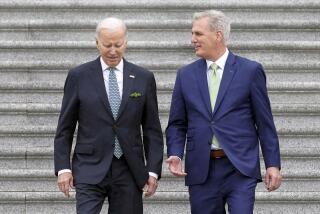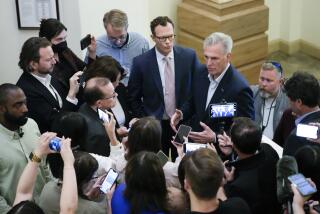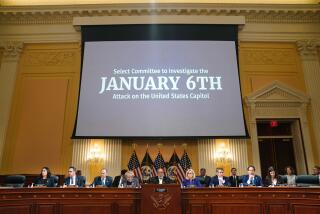Bush Urges Bipartisanship to Get Accord on Medicare Bill
- Share via
WASHINGTON — President Bush called members of the Medicare conference committee to the White House on Wednesday to urge them to work across party lines to produce a compromise bill as quickly as possible.
“The theme was bipartisanship, working together,” Sen. Max Baucus (D-Mont.) told reporters after the meeting. “That’s going to be the real test here.”
Seconds later, Rep. Bill Thomas (R-Bakersfield), the chairman of the committee, illustrated what a trial it would be. Stunning Republicans and Democrats alike, he accused committee members of practicing bipartisanship “just in front of the cameras.”
The next major test for the committee will come today, when members gather for only their second meeting to discuss how to split the significant differences between the House and Senate bills.
The lawmakers’ staffs have been working to iron out differences in technical, noncontroversial sections of the bills, and committee members are expected to agree in principle on the compromises.
“We’ll show some progress” today, said Sen. Charles E. Grassley (R-Iowa), vice chairman of the committee.
Committee members may also try to set a September deadline for sending a conference report to the House and Senate, a timetable they discussed generally with the president.
They steered clear of discussing specific provisions of the legislation with Bush, and they tried in their statements to reporters to remain focused on his charge to get the job done.
A $400-billion Medicare reform package with a prescription drug benefit is something Bush “expects us to deliver on,” said Senate Majority Leader Bill Frist (R-Tenn.)
Rep. W.J. “Billy” Tauzin (R-La.) predicted that the committee would pass the bipartisanship test, delivering a bill to the president and a drug benefit to 40 million senior and disabled Medicare beneficiaries.
No one “expects to leave here in the fall with $400 billion on the table and seniors without coverage,” he said.
But away from the microphones, some lawmakers acknowledged that the task would be extremely difficult. Complicating matters, said one senator, is that seniors “aren’t banging on our doors to get it done. They want the benefit,” but the specifics are difficult for them to understand.
More to Read
Get the L.A. Times Politics newsletter
Deeply reported insights into legislation, politics and policy from Sacramento, Washington and beyond. In your inbox three times per week.
You may occasionally receive promotional content from the Los Angeles Times.










